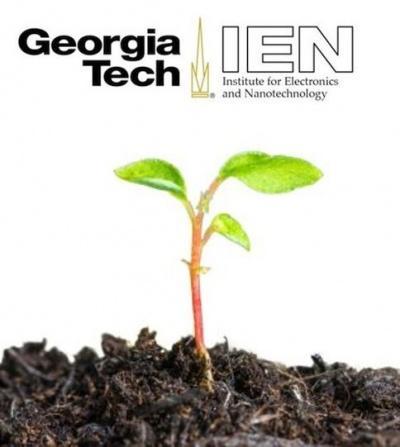2021-2022 Georgia Tech Institute for Electronics and Nanotechnology (IEN) Core Facilities Seed Grant Program
Mar 02, 2021 — Atlanta, GA

IEN Seed Grant logo
Program Description
The Georgia Tech IEN is an Interdisciplinary Research Institute (IRI) comprised of faculty and students interested in using the most advanced facilities for fabrication, characterization, and cleanroom processes, to facilitate research in micro- and nano-scale materials, devices, and systems. Applications of this research span all disciplines in science and engineering with particular emphasis on biomedicine, electronics, optoelectronics and photonics, and energy applications. As there can be a learning curve associated with initial proof-of-concept development and testing using cleanroom tools, this seed grant program was developed to expedite the initiation of new graduate students and new research projects into productive activity. Successful proposals to this program will identify a new, currently-unfunded research idea that requires core facility access to generate preliminary data necessary to pursue other funding avenues.
Program Eligibility
This program is open to any current Georgia Tech or GTRI faculty member as project PI. The graduate student performing the research should be in the first 2 years of their graduate studies, and preference will be given to students who are new users of the IEN facilities. The student’s research advisor (project PI) does not need to be a current user of the IEN cleanroom/lab facilities. Current PI awardees cannot apply in consecutive funding periods.
Award Information
Each seed grant award will consist of free core facility access to the student identified in the proposal over a 12-month period (4 consecutive billing quarters) up to a maximum of $6600 in charges. This award amount is based on the current access rates and the academic cap on quarterly charges and equates to 2 free billing quarters spread over one year in order to provide maximum flexibility in access. This maximum award amount is still in effect even if IEN non-cleanroom (lab) equipment, electron beam lithography (EBL), or tools in the Materials Characterization Facility (MCF) are required. Access to facilities other than IEN/MCF are not covered by the seed grant.
In addition, each student will be offered up to $500 in travel support to attend a scientific conference where they will present (oral or poster) the work resulting from this seed grant. This travel can be used during the award period or up to a period of 6 months following.
The number of awards for each proposal submission cycle will depend on the number and quality of the proposals.
Expectations
The seed grant will begin with a group kickoff meeting (mandatory for students) with IEN technical staff and will also include periodic check-in meetings as required. Members of the IEN processing staff will also be available to consult as needed during the project period. The designated student user is expected to only utilize the seed grant for core facility access while working with the PI on the proposed project. A short progress report is submitted at the mid-point of the project, and a longer report describing the research activities and outcomes is required at the completion of the award period. Students may also be requested to present a poster at the annual IEN User Day event.
Submission Schedule
This Seed Grant program is offered in two competitions each year with due dates on April 1, 2021 and October 1, 2021 for research activity that will begin on June 1, 2021 and December 1, 2021, respectively.
Proposal Requirements (2 pages max)
The proposal (submitted as a PDF file of no more than 2 pages) should do the following:
1. Provide a project title. List name of faculty PI and student at the top of the proposal.
2. Identify the research problem and specify the proposed methods.
3. Indicate the IEN research tools necessary to conduct the research. It is recommended that you obtain assistance with this component from members of the IEN or MCF technical staff.
4. Describe the relationship of this research to the PI’s other research activity and how it is distinct from and not an extension of ongoing work.
5. Identify the PI and the graduate student involved (including year of graduate work), and if there will be a mentoring relationship with the PI’s other students. Note if there are collaborative relationships with Georgia Tech faculty that bear on this research project.
6. Specify the potential for follow-on funding based on the results of this initial work.
Some helpful hints: Proposals should not excessively discuss the motivation and impact of the research. While this is helpful for understanding the importance of the work, please be brief. More important is a detailed description of what you propose to actually do (fabrication and/or characterization) in the core facilities so that this can be assessed for how feasible and realistic it is. We understand that this research is being undertaken by a beginning graduate student with limited experience who will likely require staff assistance. In addition, there may be multiple approaches to the research problem. However, you should clearly describe at least the most promising approach in detail within the page limitations.
Submit the PDF file by the specified due date to Ms. Amy Duke (amy.duke@ien.gatech.edu).
Review Criteria
Proposals will initially be reviewed by IEN staff for technical feasibility within the time frame. Rating of proposals will be done by a review committee of Georgia Tech faculty, with final selection of awardees by IEN staff. Review criteria include novelty of the research, clarity of the proposed work, work that is technically achievable within the time constraints, and likelihood of positive outcomes (future funding).
For more information, please contact Dr. David Gottfried, dsgottfried@gatech.edu, (404) 955-9733.
Dr. David Gottfried, dsgottfried@gatech.edu, (404) 955-9733.




